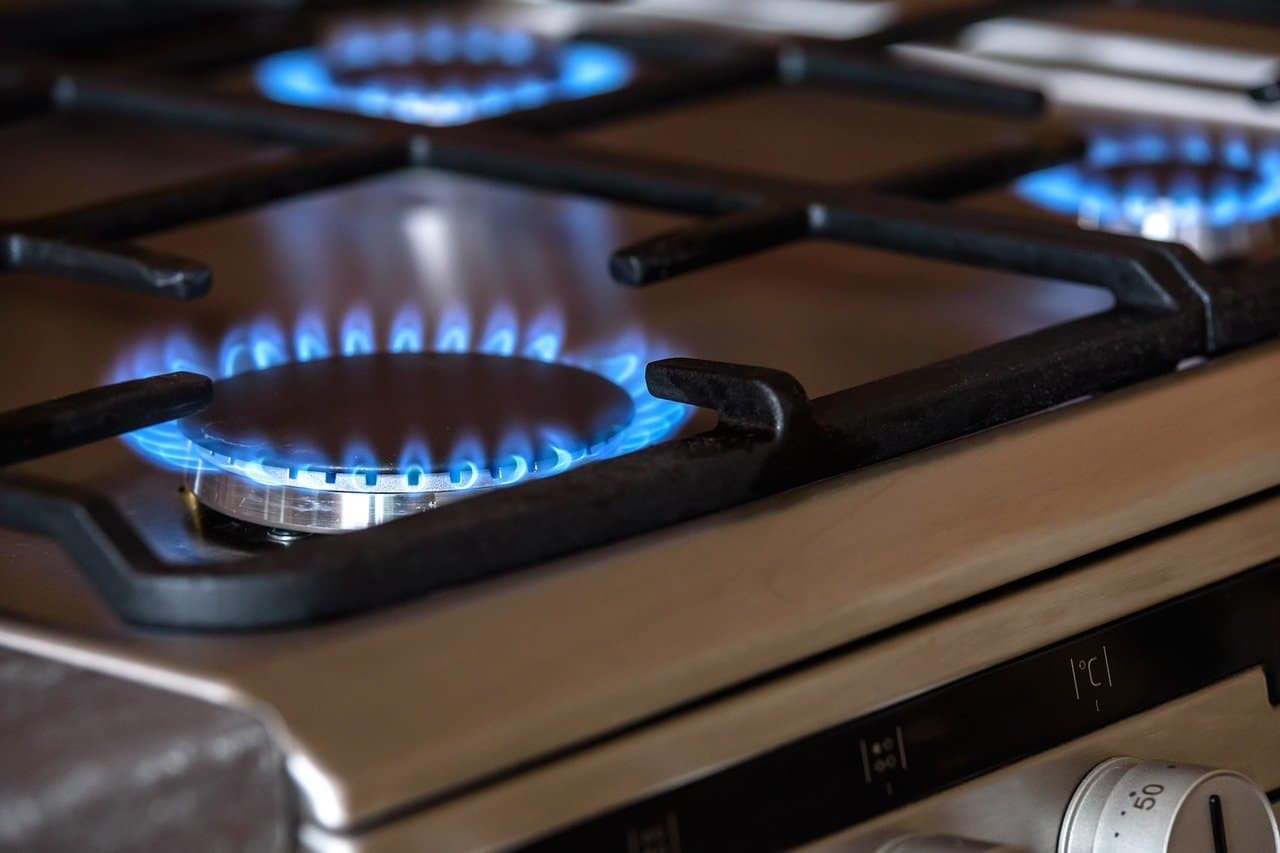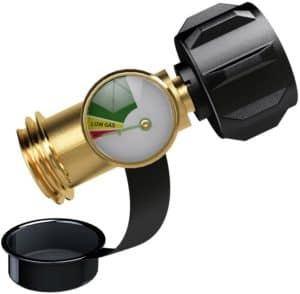One of the most common ways to power RV appliances is through propane, which often powers the heater, range, and even the refrigerator on an RV.
But while propane is a cheap and easy way to bring all the comforts of home with you while traveling in an RV, there are some best practices you need to be aware of to safely use propane in an RV.
Such as monitoring your RV propane tanks and appliances for leaks or malfunction before they become a safety issue.
Because RV propane tanks can leak and fail just like any other type of propane tank, so it’s important to know how to detect a propane leak and what to do if you have one in your RV.
Now, let’s take a closer look at a typical RV propane system so we have a better understanding of how they work, as well as, how to detect and handle a leak or malfunction in the system.
How to Check for an RV Propane Leak
There are four main ways to tell if your RV is leaking propane including the smell of propane gas, propane gas detector alarms, propane leak detection solution, and a manometer.
And if any of these leak detection methods indicate you might have a propane leak, immediately shut the propane off by closing the propane shut-off valve on the tank, and have a licensed RV technician further inspect the propane system to determine the source of the leak and repair it.
The Smell of Propane Gas
The most common way people first notice their RV is leaking propane is they begin to smell trace amounts or a hint of propane gas, which smells like rotten eggs.
Either inside the RV or around the outside of the RV, especially where the tanks are located.
Propane or LP Gas Leak Detector Alarm
A propane or LP gas leak detector alarm like this popular one on Amazon is a great first line of defense against propane leaks in your RV.
As a propane detector alarm can alert you to even the most minute traces of propane inside the RV.
And while most RV manufacturers install a propane leak detector as a standard safety feature, if you have an older RV or your RV doesn’t have one, you should definitely install one.
Propane Leak Detection Solution
Another way to determine if your RV has a propane leak is by applying a leak detection solution like this one on Amazon onto all the connections and fittings of your RV propane system to determine if you have a propane leak.
To perform this test you simply apply a liberal amount of propane leak detection solution onto all the connections and fittings of your RV system and if you see bubbles forming on any of these connections or fittings you have a propane leak.
Also if you don’t happen to have any leak detection solution on hand, you can also use soapy water to perform the same type of test.
Manometer
The last way to detect a propane leak on an RV is to use a manometer, which is a device that is hooked directly into the RV propane system.
A manometer will gauge the pressure of the RV propane system to see if there is any fall-off in pressure, which would indicate a propane leak.
However, because a manometer has to be connected to the RV propane system directly, this is a test best left to a professional RV technician.
Is a Carbon Monoxide Detector the Same as a Propane Detector?
RVers are often confused about the differences between a carbon monoxide detector and a propane detector or even assume they’re the same thing.
However, a carbon monoxide detector and a propane detector are actually two different types of devices, as they test for two different things.
There are however some detector alarms that will actually monitor both carbon monoxide levels as well as propane gas in the air like this popular one on Amazon.
Carbon Monoxide Detector
Carbon monoxide detectors are essential in RVs because they sound an alarm if the carbon monoxide levels become too high inside the RV.
This is important because carbon monoxide can be a dangerous by-product of many RV appliances.
Such as propane heaters, cooktops, ovens, and even the fridge, if the propane doesn’t burn fully, which can lead to CO poisoning.
Propane Detector
A propane detector on the other hand is a detector that will sound an alarm if propane is detected inside the RV.
Which is also important, as propane gas will displace oxygen in an RV.
Leading to a host of issues up to and including death as less oxygen becomes available inside the RV.
So a propane detector protects you before the propane is consumed by detecting a propane leak in the RV.
While a carbon monoxide detector protects you from danger after the propane has been burned in the RV by detecting carbon monoxide.
Trouble Shooting and Keeping Your RV Propane System in Top Working Order
Bleed The Propane System When Appliances Won’t Light
A common issue many RVers encounter when trying to turn on RV propane appliances, especially after the RV has been stored for an extended period of time, is they can’t get their propane appliances to light.
One way to alleviate this issue, however, is to bleed the RV propane system by turning on and lighting the propane stove and letting it run for at least 30 seconds to a minute.
As this will remove any oxygen that might be in the propane lines.
So that all the other RV appliances have a good supply of propane free from oxygen.
You can tell if you’ve successfully bled your RV propane system when the propane burner flame turns from yellow to a consistent blue.
Disconnect and Connect the RV Propane Bottle If There’s No Propane In the RV
If you’re not getting propane into the RV and know you have propane in the tanks, you might have tripped the excess flow valve.
The excess flow valve is located inside the pigtails that attach to your RV’s propane tank and is a safety feature that will shut off the supply of propane if it senses too much pressure.
To reset the excess flow valve all you need to do is shut off the propane tank by closing the shut-off valve.
Then disconnect and reconnect the pigtail hose from the tank.
As this will release the pressure on the excess flow valve, allowing it to reset.
Remove the Appliance Acces Covers Annually for Inspection and Cleaning
Once a year it’s a good idea to remove the appliance access panels on the exterior of your motorhome or trailer to check all the connections as well as the burner chamber for each appliance.
To make sure everything is in proper working order and to remove any debris that might have accumulated inside such as leaves, dirt, or bugs.
Once A Year Take Your RV to a Certified Service Facility for a Propane Leak Check
While you can do some basic propane leak detection at home, to get a full and thorough check-up on your RVs propane tank and system you should be taking your RV to a certified service repair shop for a thorough check and pressure test once a year.
As an RV service repair shop has specialized equipment such as a manometer to check for very minute leaks in your RV propane system.
Manually Change Over the Auto Regulator When the Primary Propane Tank Runs Out
While motorhomes typically have a single mounted propane tank.
Travel trailers and fifth wheels will usually have a dual propane tank system with an auto regulator connected between the two tanks.
Which will automatically switch from the primary tank to the secondary, when the primary runs out.
However, you can lose up to 30% efficiency on the secondary propane tank, if you don’t manually switch the auto regulator to the second tank.
So when the primary propane tank runs out on your RV.
Make sure to manually switch the auto regulator to the secondary tank, while you remove the primary to have it refilled.
Use a Propane Gage to Know Your Propane Levels
While motorhomes typically have an inline propane gage built into their propane system, most travel trailers and fifth wheels do not, leaving you to guess what your propane levels might be.
So if you don’t want to run out of propane in the middle of a cold night, use an inline propane gauge like this popular one on Amazon that connects between the tank and the propane hose.
Or for the ultimate, invest in an RV propane monitor system like this one on Amazon that attaches to the side of the propane tanks and actively monitors the propane levels sending this information to any connected Bluetooth device.
Know and Understand Your Propane Detector
Propane leak detectors are an invaluable piece of equipment in an RV, as they help to keep you and your family safe while using propane.
So it’s important to understand how your propane detector works by keeping these tips in mind.
- Always maintain power to the propane detector as a low battery in your trailer can cause the propane detector to go off.
- Check the propane detector on a periodic basis by pressing the test button on the front of the detector to make sure it’s working properly.
- Propane detectors have a usable life of 7 years and should be replaced after this period of time to ensure the propane detector is working properly in your RV.
When Cold Weather Camping Keep Your Propane Tanks Topped Off
When cold weather camping, makes sure to keep your propane tanks as full as possible, to keep your propane appliances running properly.
As this will provide more surface area on the tanks to turn the propane from a liquid, which is how it’s in the tank, to a vapor, which is what your propane appliances use for fuel.
Recent Posts
When cruising down the highway in your RV, the last thing you want is a tire blowout! Not only is it dangerous, but RV tire replacement isn't cheap, costing $200 to $300 per tire. The good news,...
Nothing ruins an RV adventure faster than a breakdown with no way to fix it. Because of this, every RVer should have a well-stocked RV tool kit for those unexpected roadside emergencies and campsite...


